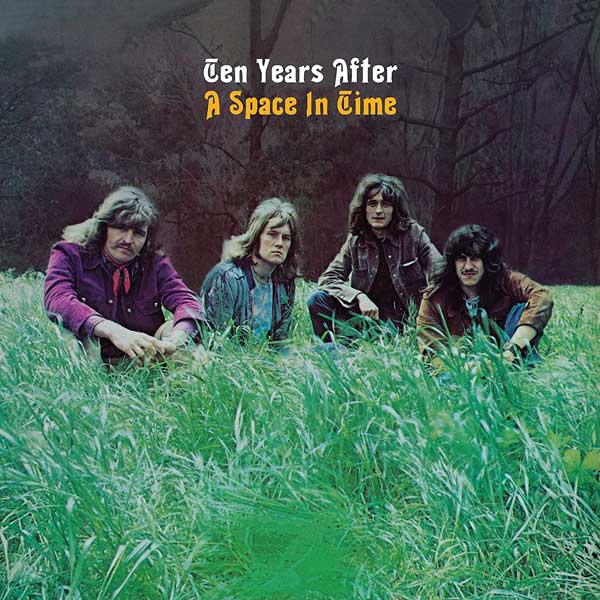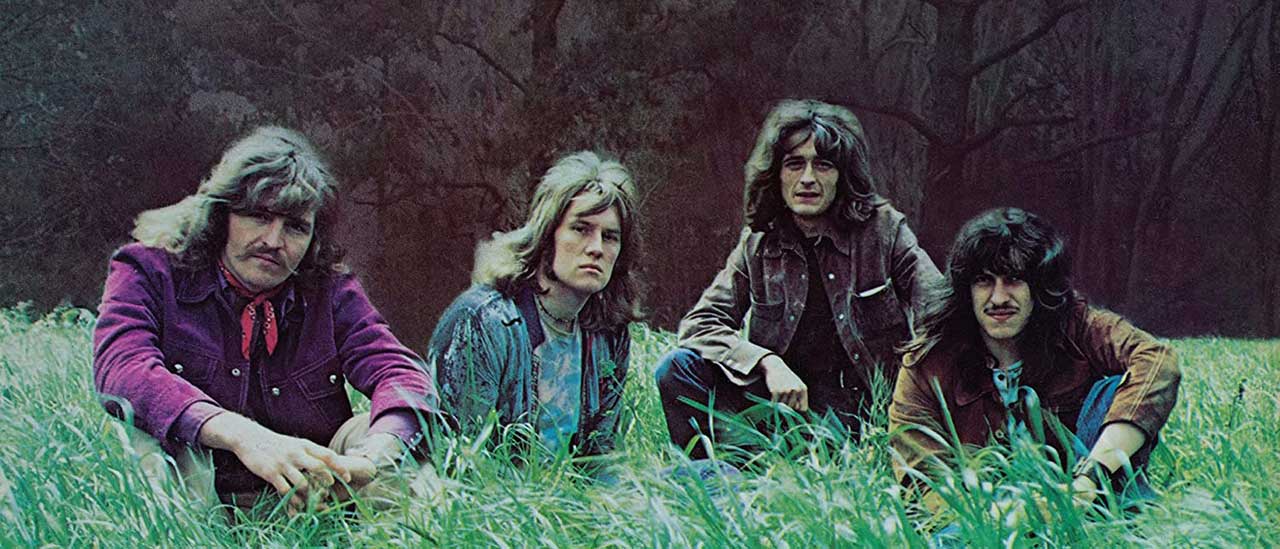
One of These Days
Here They Come
I'd Love To Change The World
Over the Hill
Baby Won't You Let Me Rock 'n' Roll You
Once There Was A Time
Let the Sky Fall
Hard Monkeys
I've Been There Too
Uncle Jam
After two post-Woodstock years spent conquering America with their frenetic brand of boogie, Ten Years After finally got the space and time to add another dimension on their 1971 album.
They took full advantage. The opening slow-burning One Of These Days has a deeper, richer sound, thanks to new engineer on the block Chris Kimsey. Over half the songs start with an acoustic riff rather than an electric bludgeon. Let The Sky Fall may be a variation of the Good Morning Little School Girl riff they’d been hammering out night after night, but now it’s a languid, post-coital spliff instead of a lecherous arouser.
And then there’s I’d Love To Change The World, arguably frontman Alvin Lee’s finest song, a more succinct version of Stairway To Heaven and a product of its time, with lyrics like ‘Tax the rich, feed the poor, till there are no rich no more’ taking the countercultural position on social issues. Viewed by many as a condemnation of the Vietnam War, it was the band’s only American hit, making A Space In Time their biggest-selling album and a crucial opportunity the band didn't take advantage of.
“But by then I was too confused to take it,” Alvin told Classic Rock in 2003. “I’d Love To Change The World was a hit, and I hated it because it was a hit. By then I was rebelling. I never played it live. To me it was a pop song.”

Every week, Album of the Week Club listens to and discusses the album in question, votes on how good it is, and publishes our findings, with the aim of giving people reliable reviews and the wider rock community the chance to contribute.

Other albums released in August 1971
- Tago Mago - Can
- In Hearing of Atomic Rooster – Atomic Rooster
- Fillmore East – June 1971 - The Mothers of Invention
- Who's Next - The Who
- Surf's Up - The Beach Boys
- The Sun, Moon & Herbs - Dr. John
- If 3 - If
- A Space in Time - Ten Years After
- Sometimes I Just Feel Like Smilin' - Butterfield Blues Band
- White Light - Gene Clark
- Master Of Reality - Black Sabbath
- New Riders Of The Purple Sage - New Riders Of The Purple Sage

What they said...
"In which the rock heavy comes of age with his toughest, fullest, and most coherent album. I like it in a way, but it does lack a certain winning abandon, and I'm not crazy about the heavy's economic theories-fellow seems to believe that if you "tax the rich to feed the poor" you soon run out of rich, with dire consequences." (Robert Christgau)
"The leadoff track, One of These Days, is a particularly scorching workout, featuring extended harmonica and guitar solos. After the opener, however, the album settles back into a more relaxed mood than one would have expected from Ten Years After. Many of the cuts make effective use of dynamic shifts, and the guitar solos are generally more understated than on previous outings." (AllMusic)
"Lee’s vocals feel sympathetic and almost reticent for the lovely I’ve Been There Too. Only the rote rocker Baby Won’t You Let Me Rock N’ Roll You, a straight Chuck Berry rip, displays the trite lyrics appearing occasionally here. Guitarist Lee reels in his more notes per minute frantic intensity to deliver a subtler, more nuanced approach, dovetailing well with the similarly oriented songs." (American Songwriter)

What you said...
Greg Schwepe: Doing an album review is a little like receiving a “How’d We Do?” e-mail survey after you visit a store. The business is trying to determine the NPS (Net Promoter Score) to get a quick read on how they’re doing. If I got one of those requests for this week’s Ten Years After selection, it’d be something like this:
“Would you recommend Ten Years After A Space In Time to your friends and family? Please respond using ratings found in e-mail.”
And after listening and giving careful thought, I think I’d be all Switzerland and be decidedly…”Neutral.” Not a good album, not a bad album, just one that is kinda…there.
I have known I’d Love To Change The World for what seems like, forever. Great song. And after seeing the Woodstock movie again a few years and Alvin Lee tear it up (he can rip with the best of them!) with I’m Coming Home, I had bought a compilation CD. And after a few listens, it got sold at the local bookstore. Not like I hated anything on it, just that I wasn’t going to be missing anything if I didn’t have it.
In listening to A Space In Time I still was trying to figure who/what Ten Years After really was. Slow bluesy, jazzy stuff band? Fast “boogie rock” band? I’d Love To Change The World was already in the plus category, due to my years of hearing it. And I really liked Baby Won’t You Let Me Rock n’ Roll You. At that point in the album, they finally get out of second gear into third. Or was it third into fourth?
I’ve Been There Too and Uncle Jam both grabbed me too. The former with its slow build up and the latter with its jazzy and great guitar playing.
Overall, not a bad album, an enjoyable listen but not enough to make me really explore more of their catalogue. 7 out 10 on this one for me.
Evan Sanders: Nice pick for giving me the chance to listen to an entire Ten Years After album, as I’ve known them pretty much just for their big hit I’d Love To Change The World and their inclusion on Woodstock. I found A Space In Time to be enjoyable, mostly for the blues rock numbers, including One of These Days and the three closing songs. There are some uneven songs, Here They Come and Over the Hill. Overall, this would have been a frequent play at house parties in the early 70’s, especially to convince friends that Ten Years After is more than just their big hit. 7/10.
John Davidson: I'm familiar with Ten Years After from I'd Love To Change The World and had heard the rest of the album without really remembering any of it. Nothing much has changed since the first listen. Ten Years After are still partying like it's 1967 even though it's 1971 (which may not look like much on paper but meant everything at the time).
Dale Munday: The seventh album from this classic, not quite (but nearly) forgotten band. This album finds them in a slightly more reflective and commercial mood, or maybe moods would be better. An eclectic mix of sounds with extensive use of acoustic guitars and even orchestration. A move that paid off nicely for them as this became their best-selling album.
Mark Herrington: A Space in Time offers quite a diverse range of mainly blues rock songs, from an underrated band. Some delightful pacing and a laid-back approach make this a great album for hazy, sunny days and a couple of beers in the garden, without annoying the neighbours too much.
I like the space given and the instrumental build prevalent here that lets you enjoy their obvious talent fully. A good score from me.
Brett Deighton: This was a first listen for me and I was super impressed. I love the diversity on this album. I’m not sure how this compares to their other albums, but I will be checking those out once I post this. I wasn’t sure what I was going to get after the opening of One of These Days but it sets the scene for the album overall by building into something different. Clearly I need to hear more from Alvin Lee. His guitar playing on here is sumptuous, with I’d Love to Change the World an obvious standout for me. Let The Sky Fall was another highlight, although to be honest there isn’t a weak track on here. Excellent nomination, a worthy classic album.
Peter Thomas Webb: I bought A Space in Time as a teenager, after seeing Alvin Lee and Ten Years After's incendiary performance in the feature film of Woodstock. At first I was surprised by the more subdued nature of the album, but it soon grew on me. Lee still adds plenty of impressive guitar licks to the songs, but overall the album focuses more on songs than guitar pyrotechnics.
Certain lyrical moments, such as the "dykes and fairies" line in I'd Love to Change the World feels awkward (although it's safe to assume Lee's "conservative" voice in the song is meant to be ironic). Other songs, such as the anti-drug lament Hard Monkeys, signal the death of sixties idealism.
My favourite track remains One of These Days (not to be confused with Pink Floyd's identically titled track the same year). The slow-burning blues riff and dynamics expressed by Ten Years After on that song show why they were once contenders for the top tier of the seventies rock pantheon.
Hai Kixmiller: Do you know who Mike Campbell, Christopher Hayes, or Alvin Lee are? Most people couldn't tell you that these are a few of the most talented and underrated guitarist from some of rock's most successful and well-known bands. Aside from his I'm Going Home guitar solo at Woodstock, Alvin Lee, guitarist and vocals for Ten Years After, gets little mention for much of his playing. Pay attention to the last part of Here They Come where Alvin does this harmonic tapping technique on his acoustic guitar. When someone mentions tapping techniques, on the guitar, most guitar enthusiasts usually think of Eddie Van Halen. Not bad company to be mentioned with.
A Space In Time is a stellar, acoustic guitar-driven rock album, with slices and grooves of boogie-woogie and blues shuffles. Most of the songs carry an amalgamation of beatnik soul searching, hippie counter-culture, and proto-stoner rock vibes with that rhythmic, percussive bass or guitar drone with that cool echo effect, reminiscent of Donovan's Season Of The Witch or The George Baker Selection's Little Green Bag.
The most notable stand-out track is I'd Love to Change the World. With its timeless, geopolitical and social themes it's as much a reflection of the present as it is an echo of the past.
Get your headphones for this one. Like Timothy Leary said, "Turn on, tune in, and drop out". A Space in Time is definitely worth the "trip".
Mike Canoe: On the whole, Ten Years After is a band that's still a little too "British Blues Explosion" for me but I'm delighted they made this week's pick, especially A Space in Time.
The only song I knew going in, of course, was the mesmerising and melancholy, I'd Love To Change The World. The lyrics always made me wonder if Alvin Lee was singing from his perspective or the point of view of his parents' generation. Either way, the hopelessness of the state of the world was in the early 70s and the malaise it caused still rings true.
While that track is still the showpiece for me, I also like the enigmatic Here They Come, which sounds like a welcome to visitors from the stars via chariots of the gods.
On the bluesier side, there's the apocalyptic Let the Sky Fall which predicts impending catastrophe - should the couple ever break up. Wait, what? Now that's a heavy trip to lay on someone.
Hard Monkeys is also an interesting tune - a fervent anti-drug song in a heyday of hedonism. Of course, the album was released the year after the drug deaths of Jimi Hendrix and Janis Joplin and a month after the death of Jim Morrison. The Summer of Love was racking up a body count.
As I alluded to up top, Ten Years After is one of those classic rock bands that might not immediately jump to mind but are certainly worthy of discussion. A Space in Time feels like the right place to start.

Final score: 7.98 (50 votes cast, total score 399)
Join the Album Of The Week Club on Facebook to join in. The history of rock, one album at a time.


